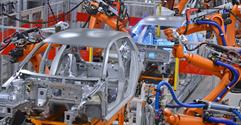When we think of manufacturing, it might be tempting to imagine exhausted employees in harsh working conditions, producing car parts and other industrial materials. But the reality is, the manufacturing industry is hardly so stereotypical or narrow.
Manufacturing itself simply refers to the process of producing physical goods, or “things” –– and that means literally anything. Manufacturing interfaces with the economy in a way that no other industry does, because every single thing we use is produced through manufacturing.
What does this mean for business owners? Nearly limitless opportunities. The industry is vast, and in our consumer goods-driven society, there is an everlasting need for makers who can produce goods to meet the cultural supply and demand, especially now that the economy is recovering post-recession.
If you’re a manufacturing business owner, you know that running this kind of business comes with its own unique set of challenges, especially in a landscape that’s rapidly changing in the wake of almost complete technological dependence. Let’s explore what it takes to run a manufacturing business, analyzing industry trends and looking towards the future of the industry.

Types of Manufacturing
To truly understand the breadth of the manufacturing industry, it’s essential to look at the big picture as it expands multiple sectors. Let’s discuss some of the primary and
Foods
We all gotta eat! That’s probably why food manufacturing is one of the most economically pervasive manufacturing sectors. This sub-industry includes agricultural and livestock production, as well as
Textiles
The clothes off our backs and the rugs under our feet –– they all come from textile manufacturers, who make products like apparel, leather, and upholstery fabrics.
Wood and Paper
As the saying goes, if you build it, they will come. But where do you get the materials anyways? Wood manufacturing is a huge sector that produces raw materials, like plywood, and finished goods like furniture. And don’t forget about paper production, too!
Industrial
Perhaps the most stereotypical of all manufacturing industries, industrial manufacturing has been around a very long time. Industrial manufacturers produce materials like
Chemical
Chemical manufacturing might sound like a code name for a secret government science project, but the goods produced there come a little closer to home. Chemical manufacturers produce pharmaceuticals to keep you and your family healthy, cleaning products to keep your home germ free, and pesticides and fertilizers for the farm.
Machinery
Machinery manufacturing is another sector that might come to mind when imagining the industry at large. This sector is responsible for the production of auto parts, construction and mining equipment, and household appliances.
Technology
As a manufacturing business owner, you know that tech manufacturing has been at the forefront of the industry for some time. That’s not changing anytime soon, due to our population’s dependence on electronic devices produced by tech manufacturers, like our computers, tablets, and smartphones.

The Day to Day
The day in the life of a manufacturing business owner is predictably packed.
Running a manufacturing business requires a specific personality type, and not everyone is right for
the job. Business owners must be true multi-taskers; staffing is needed most for production, so other managerial, financial and administrative tasks likely fall to the business owner.
That means that as you run your business, you’ll have to be equally comfortable managing people and processes. You might be the boss, the admin, the payroll person, the HR representative, and the primary motivator for your employees.
Tangible Success Indicators
In most industries, indicators of success aren’t so transparent. Key performance indicators (KPIs) might look like customer satisfaction or conversion, “proof” that can be hard to measure or substantiate without very specific data.
One of the many benefits of running your own manufacturing business is that the most telling KPI is quantitative: how many products or materials can your workers produce every hour, day, week, month, quarter, or year?
That’s why keeping your employees happy should be at the top of your to-do list, especially as the training and education gap in the workforce continues to diverge away from the hard skills that are necessary for manufacturing.
While there are many essential aspects of running your business –– i.e. maintaining customer expectations, communicating with material vendors and retailers, and ordering supplies –– without a robust, motivated workforce, your business will cease to exist.

Maintaining Your Business
One of the most challenging aspects of running a manufacturing business is staying up to date on compliance regulations for your sector. Without a commitment to compliance, your business is constantly at risk, both from health and safety issues and from OSHA interference.
When running your business, it’s essential to stay up-to-date on changing compliance regulations to protect your company, your employees, and your future.
The Future: Tech and Manufacturing
In 2018, the industry steadily skews away from industrial manufacturing and further down the path of technological production, with workers creating the tech devices we need to power our advancing lifestyles. This is an exciting time for manufacturing business owners, as new pathways in the industry continue to open up, paving the way for new opportunities for growth.
While the business journey is ongoing and you are always striving to reach your goals, there may come a time when you’re ready to move on. If you’ve built a successful manufacturing business and you’re exploring selling your business, our library of resources can help guide you through your decision.



